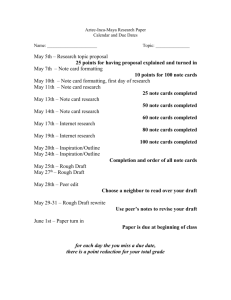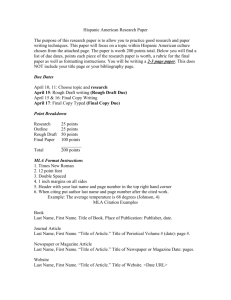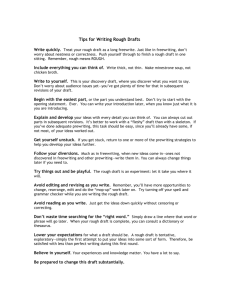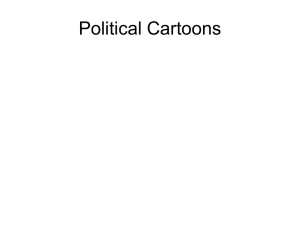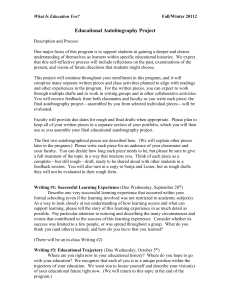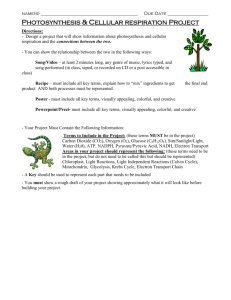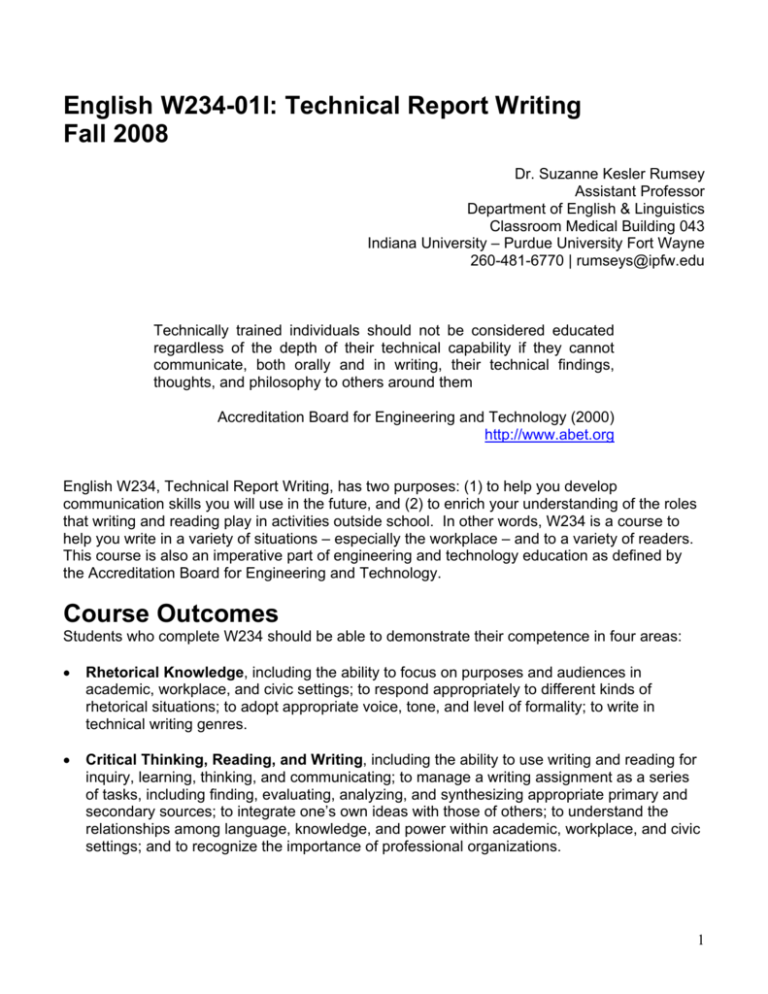
English W234-01I: Technical Report Writing
Fall 2008
Dr. Suzanne Kesler Rumsey
Assistant Professor
Department of English & Linguistics
Classroom Medical Building 043
Indiana University – Purdue University Fort Wayne
260-481-6770 | rumseys@ipfw.edu
Technically trained individuals should not be considered educated
regardless of the depth of their technical capability if they cannot
communicate, both orally and in writing, their technical findings,
thoughts, and philosophy to others around them
Accreditation Board for Engineering and Technology (2000)
http://www.abet.org
English W234, Technical Report Writing, has two purposes: (1) to help you develop
communication skills you will use in the future, and (2) to enrich your understanding of the roles
that writing and reading play in activities outside school. In other words, W234 is a course to
help you write in a variety of situations – especially the workplace – and to a variety of readers.
This course is also an imperative part of engineering and technology education as defined by
the Accreditation Board for Engineering and Technology.
Course Outcomes
Students who complete W234 should be able to demonstrate their competence in four areas:
•
Rhetorical Knowledge, including the ability to focus on purposes and audiences in
academic, workplace, and civic settings; to respond appropriately to different kinds of
rhetorical situations; to adopt appropriate voice, tone, and level of formality; to write in
technical writing genres.
•
Critical Thinking, Reading, and Writing, including the ability to use writing and reading for
inquiry, learning, thinking, and communicating; to manage a writing assignment as a series
of tasks, including finding, evaluating, analyzing, and synthesizing appropriate primary and
secondary sources; to integrate one’s own ideas with those of others; to understand the
relationships among language, knowledge, and power within academic, workplace, and civic
settings; and to recognize the importance of professional organizations.
1
•
Writing Processes, including the use of multiple drafts to create and complete a successful
text; the development of flexible strategies for generating, revising, editing, and proofreading; learning to balance the advantages of relying on others with the responsibility of
doing one’s own part; participation in collaborative and social processes and genres that
require the ability to critique one’s own and others’ works; and using a variety of technologies
to address a range of situations.
•
Knowledge of Conventions, including the ability to follow common formats for different
kinds of technical genres; to increase knowledge of genre conventions ranging from
structure and paragraphing to tone and mechanics; to practice appropriate means of
documenting one’s work according to workplace and professional standards; and to control
such surface features as syntax, grammar, punctuation, and spelling.
Required Text
Johnson-Sheehan, R. (2007). Technical Communication Today. 2nd Ed. New York:
Pearson/Longman.
Assignments
Exercises and projects in this course are designed to help you meet the six objectives listed in
the previous section. Your work on those assignments will be evaluated using a numerical
system which will eventually be converted to a letter grade. Table 1 below describes the projects
you will complete during the semester. Major projects often have several parts, so be sure to
consult each project assignment page for details.
Assignment
Netiquette Email
Introduction Memo
Job Search Project
Investigative Report Rough Draft
Resume and Cover Letter Rough Draft
Final Draft of Entire Project
Reflective Memo
Instructions Project
Purpose
To establish guidelines for
professional communication; to
open lines of communication
between professor and student
To learn formatting of
memorandum; to foster learning
community within the classroom
To learn about the role of writing
in the job search; to practice
research skills; to practice
document design and writing for
workplace settings
Percentage
5%
20 %
To learn principles of
documentation and the writing of
2
Document Plan Rough Draft
Evaluation Plan Rough Draft
Instructional Text Rough Draft
Final Draft of Entire Project
Reflective Memo
Proposal Project
Project Plan Rough Draft
Formal Proposal Rough Draft
Final Draft of Entire Project
Reflective Memo
Peer Reviews
Quizzes
instructions; to apply those
principles to an actual case
To define a real need or
opportunity and to propose a
plan for addressing it
To help classmates develop their
written projects, and to gather
feedback on yours
To reinforce course concepts; to
practice skills needed for the
major projects
25 %
25 %
25 %
Short Exercises and Discussion
Boards
Letter grades are equivalent to the following:
A = 90 – 100 %
B = 80 – 89 %
C = 70 – 79 %
D = 60 – 69 %
F = 59 % and below
Specific criteria for each project will be discussed at appropriate times throughout the semester.
You must submit at least one version of each project in order to pass the course.
Preparation & Deadlines
Class projects require your active participation; it is important that you complete exercises,
quizzes, and assignments, and respond to your classmates in the discussion board in a timely
manner.
Just because we are online does not mean you should not attend or address the procedures of
the class. Everyone must participate for the class to function in this space, so please set time
aside to take care of class work. I know it sounds weird, but you can still miss too much time
even online, resulting in missing assignment deadlines and important announcements.
3
The class runs on a Monday/Wednesday schedule. In other words, most deadlines fall on
Mondays, and Wednesdays by midnight.
Late Work
I reserve the right to refuse to read exercises and projects submitted late. If I do accept
late work, it is subject to a deduction. No work will be accepted more than one week later than
its scheduled due date.
Office Hours
I will hold office hours:
Mondays 2 to 3 p.m. and 4:30 to 5:30 p.m.
Wednesdays 3 to 5:30 p.m.
You are welcome to come see me “in person” during these times. But, in general, the best way
to contact me is via email at rumseys@ipfw.edu. I check my email several times a day during
the work week. Emails received over the weekend or overnight may not be read until the
morning of the following business day.
Ethics and Plagiarism
The IPFW 2006-2008 Undergraduate Bulletin describes plagiarism as “a form of cheating in
which the work of someone else is offered as one’s own. The language or ideas thus taken from
another may range from isolated formulae, sentences, or paragraphs, to entire articles copied
from printed sources, speeches, software, or the work of other students” (272). To borrow
someone else’s writing without acknowledging that use is the worst form of academic
dishonesty, which can result in failure for the course as well as sanction from the University.
(See the section entitled “Academic Honesty” in the bulletin.) The "ghost writing" of a paper also
can lead to sanction from the University. That is, you should never do someone else's
homework for them.
You must do your own original work in this course--and to identify that portion of your work
which is collaborative with others, or borrowed from others, or which is your own work from
other contexts. Whenever you quote passages, borrow graphics, or use ideas from others,
you are legally and ethically obliged to acknowledge that use, following appropriate
conventions for documenting sources.
You may revise work that you have done or are doing in other courses as long as it meets the
following conditions: (1) it is your own work, (2) you plan an extensive revision for this course,
and (3) you have informed, and have received the approval of, your instructor. If you have
doubts about whether or not you are using your own or others’ writing ethically and legally, ask
your instructor.
4
I reserve the right to make changes and updates to this syllabus throughout the
semester. You will be notified of all changes in writing.
5

